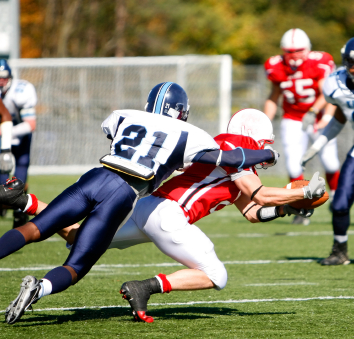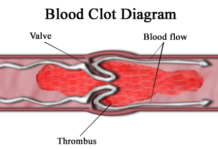Jared Hagely, 18, a senior at Francis Howell High School in St. Charles, MO, has suffered three concussions in his four years playing high school football. “While my concussion was being treated I noticed it was very difficult for me to focus, and I got lazy” Hagely tells SciJourner.
According to the National Federation of State High School Associations, an estimated 140,000 high school athletes across the United States suffer a concussion each year. These concussions affect a person both short term and long term. Familydoctor.org tells us that a concussion, usually caused by a blow to the head, can result in symptoms that include memory loss, confusion, severe headaches, concentration problems, nausea, and even throwing up. .
Loretta Wiley, a teacher at Francis Howell, says she notices athletes suffering from concussions. “Yes, assignments take longer, and extra time is given for them. Complaints of focusing too hard on small type, such as reading, gives headaches”
WebMD explains that there are other symptoms of concussions that are harder to detect, and can last much longer, such as memory loss. Even after his concussion had healed, Jared says, “I have a lot more trouble remembering simple things now.”
Concussions are not completely avoidable, but according to Coach Bryan Koch, the head football coach at Francis Howell, “to avoid concussions in practice and games, we use the very best equipment available!”
“Every player is educated about concussions, so I would hope that every player would say something to a coach if he is experiencing anything abnormal, but cannot be sure,” says Coach Koch. High school athletes are extremely competitive, so many of them just try to tough it out with a concussion, which can have very bad consequences.
Francis Howell athletic trainer Ruth Helland says, “I send out informational packets to all athletes, parents, and coaches at the beginning of each sporting season to help educate them on the dangers of sports injuries, focusing on head injuries such as concussions and the symptoms to look for after any head injury to a student athlete.
“After a concussion is diagnosed, an athlete must rest as much as possible with no physical activity until they are completely symptom free for 24 hours,” says Helland. “Then they enter into a six-day protocol assessment, where they increase physical activity and contact daily—from jogging, to lightweight training, to then noncontact practice, and then finally a contact practice—before then being allowed to participate in games. If any symptoms appear in any of these stages, an athlete must completely restart the process over again, starting with rest.”
WebMD also says that if athletes do not take proper time off after having a concussion, it can cause prolonged symptoms, or even more severe problems such as brain damage, or, if struck in the head during recovery, death.
Hagely is a perfect example of athletes that hide their symptoms because of competitive attitude, and lack of knowledge about concussions. “The first time I didn’t tell my coach about my symptoms until after my teammate had already told him I had them.”

This work is licensed under a Creative Commons Attribution-NonCommercial-NoDerivs 3.0 Unported License














Well done article on a topic that needs attention. Player quotes about personal experiences with concussions highlights the problem.
i believe when you talk about football this is the most imortant topic to talk about and that more head protection should be required and this is the perfect article for it
this article help me understand more about concussions know I know wat to do when i get a concussion and how serise they can be when you get one.if you dont follow the symtoms then it can cause really serise damage to your brain.
Wow, football is the most common sport for getting concussions? Thats dangerous for "young" boys.
Well done article when hitting someone keep your head up
i beleive what you talkin bout is true. football collisions are very dangerous and sometimes life changing.
players love football and never want to come out, but after seeing that if you get struck in the head while having a concussion can cause death athlets should be more aware of concussions
Good informative article on concussions
football is a great sport to play; some people may think that it’s the best sport to play. Like most competitive football teens even though they’re hurt they don’t like to sit out because they want to win, but concussions are not an injury you want to play with. This article is great because it tells you the consequences to concussions if you do not take time and treat it right.